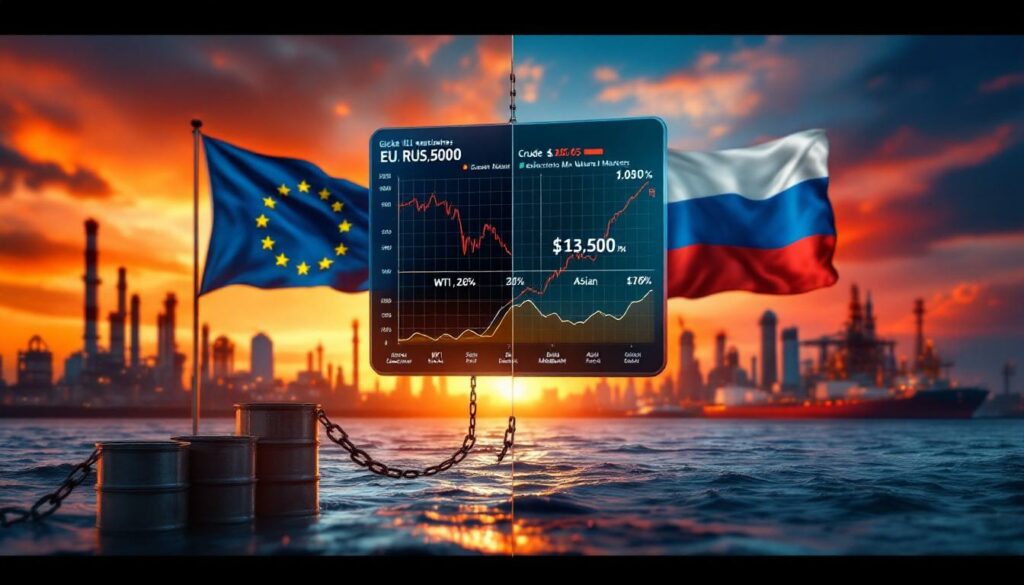How Do EU Sanctions on Russian Oil Affect Global Energy Markets?
The European Union's latest sanctions targeting Russian oil trade have sent ripples through global energy markets, with crude prices climbing amid concerns about supply disruptions and trade route reconfigurations. These measures represent a significant escalation in the economic pressure on Russia and create new challenges for energy markets already grappling with geopolitical tensions and supply constraints.
What Are the Latest EU Sanctions on Russian Oil?
New Restrictions Target Russian Energy Trade
The European Union has implemented its 18th package of sanctions against Russia, specifically targeting Russian oil trade and related financial services. These new measures include:
- Lowering the price cap on Russian oil exports to $47.60 per barrel
- Restricting European companies from providing services for Russian oil shipments
- Targeting specific Russian energy entities and their international operations
- Blocking Russian-owned refineries from exporting refined products to Europe
The sanctions explicitly target India's Nayara refinery, which is majority-owned by Russia's Rosneft. This 400,000 barrel-per-day facility accounts for approximately 16% of India's Russian crude imports in 2025 to date (285,000 b/d), according to market data from Oilprice.com.
Slovakia's Initial Resistance and Eventual Compliance
The implementation of these sanctions faced a temporary roadblock when Slovakia initially vetoed the package, seeking exemptions for Russian gas imports. After intense negotiations, Slovakia lifted its veto, allowing the sanctions to proceed while securing certain concessions for its energy security needs.
"The exemptions secured by Slovakia highlight the delicate balance European nations must strike between energy security and solidarity against Russian aggression," notes an energy policy analyst at a leading European think tank.
The compromise demonstrates the EU's determination to maintain a united front while acknowledging the varying degrees of Russian energy dependence across member states.
How Are Oil Prices Responding to EU Sanctions?
Immediate Market Reaction Shows Upward Pressure
Following the announcement of new EU sanctions, oil prices climb as EU sanctions target Russian trade with notable increases:
- WTI crude rose 1.42% to $68.50 per barrel
- Brent crude increased 1.29% to $70.42 per barrel
- Murban crude climbed 1.57% to $71.82 per barrel
These oil price movements reflect market concerns about potential supply disruptions and the reconfiguration of global oil trade flows.
Market Volatility Reflects Geopolitical Uncertainty
The sanctions have introduced new variables into an already complex market environment:
- Trading volumes have increased as investors reposition their portfolios
- Price spreads between different crude benchmarks have widened
- Futures markets show increased hedging activity against potential supply disruptions
Particularly noteworthy is the shift in market sentiment from bearish to cautiously bullish in the days following the sanctions announcement, with trading volume in WTI futures climbing 15% above the 30-day average.
What Other Factors Are Influencing Current Oil Price Movements?
Global Supply Concerns Beyond Russian Sanctions
While EU sanctions are significant, other supply disruptions are simultaneously affecting markets:
- Drone attacks in Iraqi Kurdistan have halted up to 200,000 barrels per day of production
- Several oilfields including Tawke, Peshkabir, Khurmala, and Sarsang have reported physical damage
- The restart of Kurdistan's oil exports through the Kirkuk-Ceyhan pipeline remains uncertain
The Kurdistan region's output has plummeted from 280,000 b/d to just 70-80,000 b/d following the drone strikes, further straining global supply at a sensitive time.
Inventory Dynamics and Production Trends
Market fundamentals continue to play a crucial role alongside geopolitical factors:
- U.S. proven reserves of crude and condensate dipped to 46 billion barrels as of end-2023, a 4% decline
- The Bakken play in North Dakota shed more than 600 million barrels compared to 2022
- Goldman Sachs has indicated that "the boom years of U.S. oil output growth are over"
Texas continues to dominate U.S. reserves with 43% of the total (20.1 billion barrels), while New Mexico holds 15% (6.5 billion barrels). This US oil production decline, coupled with the European sanctions on Russia, creates a concerning picture for global supply resilience.
How Are Different Global Regions Adapting to Changing Oil Trade Patterns?
Asia's Strategic Response to Western Sanctions
Eastern Asian nations are recalibrating their energy procurement strategies:
- Indonesia's Pertamina signed a memorandum of understanding with the U.S. on crude oil supply
- Thailand has increased WTI imports to 150,000 barrels per day, up 15% from last year
- South Korean refiners are evaluating U.S. crude economics against regional alternatives
These shifts are partly motivated by concerns about potential tariffs under changing U.S. administrations, with Asian buyers seeking to demonstrate commercial goodwill through increased American oil purchases.
India's Evolving Position in Global Oil Markets
India, a major buyer of Russian oil since 2022, faces new challenges:
- The EU sanctions directly target India's Nayara refinery, which is majority-owned by Russia's Rosneft
- Nayara accounts for 16% of India's imports of Russian crude oil in 2025 to date
- The sanctions may derail Rosneft's attempts to sell its stake in the 400,000 b/d Vadinar refinery
"The targeting of Nayara effectively blocks one of India's major refiners from accessing European markets, potentially scaring off potential buyers like Reliance and Aramco who were considering acquiring Rosneft's stake," notes an industry analyst from Oilprice.com.
As Russian oil discounts have dwindled from their 2022-2023 peaks, India has begun reconsidering its heavy reliance on Russian crude, creating additional market uncertainty.
What Are the Long-Term Implications for Energy Markets?
Structural Changes in Global Oil Supply Chains
The sanctions are accelerating shifts in how oil moves around the world:
- Traditional trade routes are being reconfigured as Russian oil seeks alternative markets
- New price discovery mechanisms are emerging outside traditional benchmarks
- Maritime insurance and shipping patterns are adapting to sanctions-related restrictions
Russia has developed a "shadow fleet" of tankers operating outside Western insurance markets, but these vessels often command higher freight rates, eroding Russia's ability to price its oil competitively in Asian markets.
Impact on Refining Economics and Product Markets
Downstream operations face significant adjustments:
- European refiners must secure alternative crude supplies, potentially at higher costs
- U.S. Gulf Coast refiners may benefit from new export opportunities to Europe
- Diesel cracks could strengthen as sanctioned refineries like Nayara are blocked from European markets
With Nayara effectively excluded from European markets, Reliance remains the only major Indian refinery able to export to Europe, potentially creating a bottleneck for refined product flows and supporting diesel prices globally.
How Are Oil Producers Outside Russia Responding?
North American Production Strategies
Canadian and U.S. producers are navigating a complex landscape:
- Canada's oil sands giants have become North America's lowest-cost producers, with breakeven prices around $41-43 per barrel
- U.S. shale producers are struggling to break even with new wells as WTI prices hover around $65-68 per barrel
- Rig counts in the U.S. continue to decline amid price uncertainty
Canadian National Resources (CNR) reports a remarkable 43 years' worth of production with 20 billion barrels of oil equivalent in reserves, highlighting the durability of Canada's oil sands compared to short-cycle U.S. shale. Canadian producers have dramatically reduced operational costs through autonomous vehicles, water management innovations, and AI implementation.
OPEC+ Positioning and Production Policies
The producer alliance continues to manage output amid changing market dynamics:
- Kazakhstan, despite consistently exceeding its quota, has confirmed it is not leaving OPEC+
- The group maintains production cuts to support price stability
- Saudi Arabia's role as swing producer remains crucial to market balance
"Kazakhstan's decision to remain in OPEC+ despite its chronic overproduction highlights the growing cracks in the alliance's discipline, but also underscores the continued importance of the OPEC meeting impact in maintaining price stability," observes a market analyst from Oilprice.com.
What Should Investors and Consumers Expect Going Forward?
Investment Implications in the Energy Sector
The sanctions create both challenges and opportunities for energy investors:
- Companies with exposure to Russian assets face increased compliance risks
- Energy security investments may see increased capital flows
- Alternative energy projects could benefit from heightened fossil fuel volatility
Investors should consider diversifying energy portfolios to include both traditional and renewable assets, with particular attention to companies facilitating energy security initiatives in Europe and Asia.
Consumer Price Outlook for Fuel Products
End users of petroleum products may experience varied impacts:
- Gasoline prices have risen despite oil benchmark fluctuations
- Heating oil costs may increase as winter approaches in the Northern Hemisphere
- Regional price disparities could widen based on refining capacity and import dependencies
The disconnect between crude benchmarks and retail fuel prices has been particularly pronounced in recent months, with gasoline prices rising even as oil benchmarks fell, suggesting structural issues in refining and distribution that transcend raw material costs.
How Might These Sanctions Affect the Energy Transition?
Potential Acceleration of Renewable Investments
Geopolitical instability in fossil fuel markets could boost clean energy momentum:
- Germany is adding significant wind power capacity but still may miss overall targets
- The UK has extended renewable energy contracts to 20 years in its latest Contract for Difference overhaul
- Google recently signed a record $3-billion hydropower deal to power AI infrastructure
These developments indicate that energy security concerns are increasingly driving both corporate and national investment decisions, with renewables seen as a hedge against geopolitical risk in fossil fuel markets.
Critical Minerals and Alternative Energy Supply Chains
The focus on energy security extends to materials needed for the transition:
- Ruthenium, essential for chip production and data storage, has doubled in price to $800 per ounce over the past year
- 80% of global ruthenium is supplied from South Africa, with Russia as the second-largest producer
- Only 30 tonnes of ruthenium were produced in 2024, highlighting supply constraints
This reliance on concentrated supply sources for critical minerals supply mirrors the very energy security challenges that sanctions on Russian oil aim to address, suggesting that diversification of supply chains remains a critical challenge for the energy transition.
FAQ: Understanding EU Sanctions on Russian Oil
How do EU sanctions differ from previous restrictions on Russian oil?
The latest EU sanctions represent a significant escalation by lowering the price cap on Russian oil exports and targeting specific entities involved in Russian energy trade. Unlike previous measures that focused primarily on crude oil imports into Europe, these sanctions aim to limit Russia's ability to sell oil globally by restricting financial and shipping services.
Will these sanctions lead to higher global oil prices?
While initial market reactions show price increases, the long-term impact depends on multiple factors including Russia's ability to find alternative buyers, OPEC+ production decisions, and global economic growth. The sanctions create upward pressure on prices, but market fundamentals including inventory levels and demand growth will ultimately determine price trajectories.
How might Russia respond to these new sanctions?
Russia may pursue several strategies including deepening energy relationships with non-Western countries, developing alternative payment mechanisms, creating shadow fleets for oil transport, and potentially adjusting production levels. The effectiveness of these responses will significantly influence global oil market dynamics in the coming months, particularly in light of ongoing US-China trade tensions.
Disclaimer: This analysis is based on current market conditions and available information. Energy markets are inherently volatile and subject to rapid changes based on geopolitical events, policy decisions, and market dynamics. Investors should conduct their own research before making investment decisions.
Ready to Stay Ahead of Critical Energy Market Shifts?
Discover how major shifts in oil supply dynamics create unique investment opportunities by exploring Discovery Alert's dedicated discoveries page, where our proprietary Discovery IQ model identifies actionable ASX mining and energy opportunities before the market moves. Begin your 30-day free trial today at https://discoveryalert.com.au/discoveries/ to gain your market-leading advantage.




